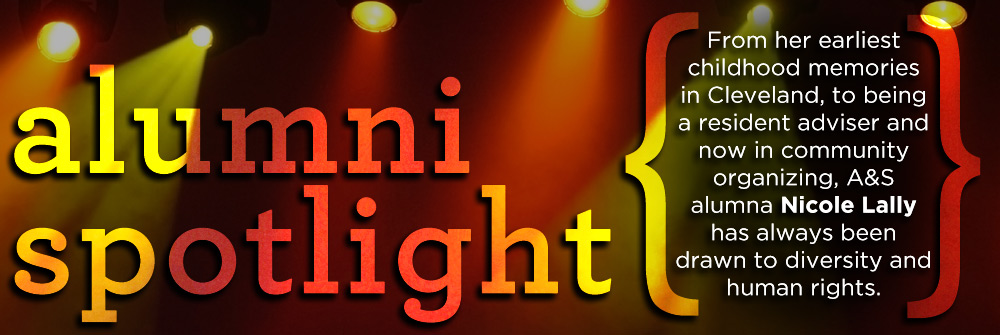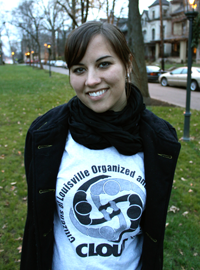
 University of Kentucky alumna Nicole Lally says her interest in sociology was sparked at an early age.
University of Kentucky alumna Nicole Lally says her interest in sociology was sparked at an early age.
When she was seven years old, Lally’s family moved from Cleveland to Elizabethtown. The change in environment was shocking, Lally said.
“On the street we lived on in Cleveland, there was so much diversity,” she said. “Elizabethtown just didn’t have those same demographics and even though I was a kid, I noticed. Some of my new friends at school would make comments about other groups of people and it just didn’t make any sense to me.”
In a high school English class, Lally was assigned an argument paper and began researching gay rights.
“I was immediately interested in anything to do with human rights,” she said. “All of the papers I was using for my research were written by sociologists and I just knew that’s what I wanted to study then.”
UK appealed to Lally because of its size and affordability.
“I knew I would save money at UK and I knew that I would get a chance to meet new people every day because it’s a large school,” Lally, who started at UK in 2003, said. Lally said she felt at home at UK and energized by the people she met.
In addition to her classes, Lally got involved on campus.
As a resident adviser in Baldwin Hall, Lally organized diversity discussions among her residents. She helped other students organize campus showings of the movie “Invisible Children,” a film about children facing enormous adversity and violence in Africa.
“These were just issues that after I was introduced to them, there was just no way I could not get involved,” she said.
During her senior year, Lally completed an independent study course with Keiko Tanaka where she researched human rights. At the same time, Lally had an internship with the Lexington Human Rights Commission.
“They were dealing with issues of discrimination in the areas of housing, employment and public accommodations,” she said. “I got to sit in to hear people talking about all of the things they were facing. I helped with affordable housing research and press releases.”
Upon graduating with her bachelor’s in sociology in 2007, Lally knew she didn’t want to jump into anything too soon. She spent time researching options that were out there for people who were interested in careers in human rights.
“I considered starting my own non-profit but it just didn’t feel right,” she said. Finally, she saw an ad on www.idealist.org for the DART Organizers Institute. DART, the Direct Action and Research Training Center, offers the “paid field school” to recruit and train good community organizers.
“I just knew immediately when I saw the description,” she said. “It felt right.”
Lally was placed in Evansville, Ind., and received a stipend while she learned the ropes of community organizing. After four months, she got a job as an associate organizer in October 2008 with CLOUT in Louisville.
CLOUT, Citizens of Louisville Organized and United Together, has been in Louisville for 19 years and works to solve systemic problems, Lally said.
“There is a difference between direct service and doing something that leads to systemic change,” Lally said. “It’s important to feed and clothe people but are you really getting at the root of the problem? What can you do to really change the system so they don’t have to come to you in the first place? That’s what this is about.”
Lally works with half of the organizations 20 congregations to build relationships and network.
CLOUT members vote on one to three issues to focus on each year, Lally explained. Last year, the group was involved with reforming pay day lending as part of its focus on economic justice.
“We also worked with banks and credit unions to encourage them to create products for people who are under-banked so that they wouldn’t need to go to pay day lenders in the first place,” she said.
In November, CLOUT turned its focus to crime and violence.
“It’s kind of an intimidating and overwhelming topic,” Lally said. “We really want to come up with some ways that we can help make an impact. Honestly, I just want to do the best job I can behind the scenes for Louisville.”
Lally said her roots in sociology help her every day.
“Sometimes I think that students think the only things you can do in sociology are teaching and research but I’ve learned that the field really can help in so many ways when it comes to looking at human rights and all kinds of issues that affect all of us,” she said.
By Sara Cunningham
photo courtesy of Nicole Lally
